Civil Liberties, Criminalizing Dissent, FBI Intrusion, Habeas Corpus, Human Rights, Political Prisoner, Surveillance, Targeting Muslims, Torture, Truth to Power, War Resister
Podcast: Play in new window | Download
Updates:
——–

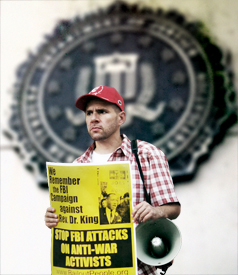
FBI to Expand Domestic Surveillance Powers
On many of our shows, we’ve discussed the broad over reaching powers and underhanded tactics the FBI use when targeting environmental or pro-Palestine activists, Mosques and Muslim-Americans. Now, new expanded FBI guidelines would allow agents easier access to search commercial or law enforcement databases, conduct lie detector tests, search people’s trash and conduct physical surveillance. Read: Anything Goes: The New FBI Guidelines
Though the guidelines are still under review, they would allow agents further access into people’s lives without suspicion of wrongdoing. The guidelines will be part of a new edition of the FBI manual, the Domestic Investigations and Operations Guide. Civil libertarians criticize the guidelines in light of recent cases such as the Fort Dix Five, the Newburgh Four and Yassin Aref in Albany, where the FBI is accused of entrapping people by infiltrating poor or specific ethnic and religious communities. Michael Ratner’s Forthcoming Book: Hell No, Your Right To Dissent
Attorney Mike German:
- The government is saying they have unfettered authority to look into your private life without any justification, and they’re claiming they don’t need any factual basis to suspect you of wrongdoing.
- National Security Letters were initially a tool to go after KGB spies, it was expanded to international terrorists. What the Patriot Act did is expand it to anyone who’s relevant to an investigation of spies or terrorists.
- The fact that the government had no reason to suspect you was no longer relevant if they could use this tool.
- That was originally set to sunset in 2005. Inspector General audit on the FBI’s use of this tool. There were five IG reports, that found the FBI were using these tools against people two or three times removed from the person of the investigation.
- Phone records, bank records, credit history and they gag the bank or place from telling you.
- IG audit found between 2003 and 2006 there were over 200 thousand National Security Letters.
- Its the FBI manual, the Domestic Investigations and Operations Guide, the FBI’s internal policy. Their internal authority created by the Department of Justice.
- These were initially designed to curb the abuse. As an FBI agent for 16 years, I found it useful to focus on the people doing bad things, not straying from that and focusing on people saying things I didn’t like, or doing things I didn’t think were right but wasn’t illegal.
- The outgoing administration in 2008 had radically altered the guidelines. People who are completely innocent and not suspected of doing anything wrong can come under suspicion and investigation under these assessments.
- The 2008 guidelines allowed the FBI to map communities based on race and ethnicity and track racial and ethnic behavior and facilities.
- Under these new guidelines 2011, an FBI agent would be allowed to search private databases, data aggregaters, that pull together all sorts of information based on marketing, state and local law enforcement information – includes if you’ve also been a victim of crime or witness to a criminal act. No factual predicate required.
- It doesn’t require attorney general approval to open an assessment. There’s no necessity to identify what federal crime they think you’re violating.
- The tools include physical surveillance, they can stand outside your house, follow you around 24/7. They can get an informant to start engaging you in a false pretense, and your friends or neighbors.
- They can interview your neighbors, they can interview your employer.
- When you become a subject of investigation you get on the terrorist watch list.
- The scary thing the Inspector General revealed, is that these (abuses) were all under the 2002 guidelines. He said where he found violations, under the 2008, this would all be perfectly legitimate.
- We at the ACLU are not just seeing the abuse with the FBI but within state and local law enforcement. You can visit www.aclu.org/spyfiles we’ve documented spying and obstruction of first amendment activity in 31 states and the District of Columbia.
- It was predictable because these laws were put in place to prevent exactly that, because that’s what the state and local police and the FBI were doing in the absence of rules.
- It’s not surprising when you take those rules away, they go into political spying mode.
- It’s very frustrating, because so much of what’s happening is happening is secret.
- Scott Crow: He found under a FOIA request, the FBI had gone to the IRS to find some small tax violation that they could put him in jail for. Because they suspected him of something, yet they had years of investigation and found no wrong doing.
- Mike German’s book – Thinking Like A Terrorist, it’s a look at what terrorists are trying to accomplish, that is to coerce the government into taking measures that actually take away the government’s legitimacy.
- Past Law and Disorder interview with Attorney Mike German.
Guest – ACLU attorney and former FBI agent, Mike German, German develops policy positions and proactive strategies on pending legislation and executive branch actions concerning domestic surveillance, data mining, freedom to travel, medical and financial privacy, national ID cards, whistleblower protection, military commissions and law enforcement conduct. German currently serves as an adjunct professor for Law Enforcement and Terrorism at the National Defense University and is a Senior Fellow with GlobalSecurity.org. German graduated from the Northwestern University Law School , and graduated cum laude from Wake Forest University with a B.A. in Philosophy. A sixteen-year veteran of federal law enforcement, German served as a special agent with the Federal Bureau of Investigation, where he specialized in domestic terrorism and covert operations. As an undercover agent, German twice infiltrated extremist groups using constitutionally sound law enforcement techniques. These operations successfully prevented terrorist attacks by winning criminal convictions against terrorists.
——————————————————————–
Civil Liberties, Death Penalty, Guantanamo, Habeas Corpus, Human Rights, Military Tribunal, Prison Industry, Supreme Court, Targeting Muslims, Torture, Truth to Power
Podcast: Play in new window | Download
Updates:
—-
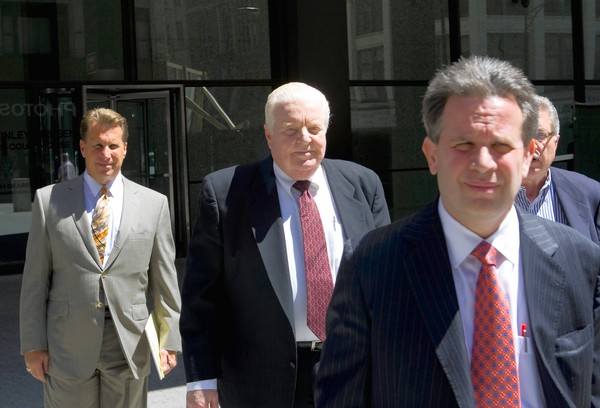
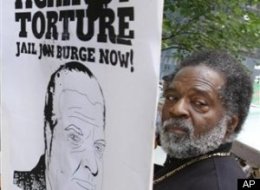
Chicago Torture Cases and Jon Burge’s Deposition
Torture has cast a long shadow over Chicago and its past administrations. Yet in the past year, with the conviction and sentencing of former Chicago Police Commander Jon Burge, Chicago has been a beacon of light in the fight against torture. Many are waiting to see how the city’s new administration will handle the ongoing torture cases of African American men that number in the hundreds. Former Chicago Police Commander Jon Burge was sentenced to 4 and a half years in prison for obstruction of justice and lying about torturing prisoners in the 1960s to obtain coerced confessions. Attorney Flint Taylor and the People’s Law Office in Chicago fought for decades to get prosecutions, and sentencing while the city poured millions of dollars to fund private lawyers for Burge’s defense.
Attorney Flint Taylor:
- We’ve been working on these cases since 1986. Deposing Jon Burge: We were reaffirming to the African American community that he was in prison and he is a prisoner.
- He was complaining about the lack of medical care and the kind of treatment he felt he should be getting.
- The struggle to put him behind bars has come to fruition. Pin stripe patronage, the city funding Burge’s defense. Rahm Emanuel needs to change course, he’s very close to Daly.
- Daly’s policy was not to settle these cases, not to apologize to the victims.
- There’s another issue about Burge getting his pension even though he’s in the joint.
- When you’re convicted you’re supposed to lose your pension.
- There’s eight people on the pension board, 4 of them are former cops.
- Several of the men who were responsible for Burge going to the penitentiary don’t have a claim civilly, never got a penny for the torture they suffered.
- There are about 20 men still in jail, still in the prisons, based on tortured confessions by Burge and his men.
- There is a demand to challenge these confessions, its been happening on a piece-meal basis.
- You most often find that torture does not lead to information that is useful. In the situation here it is to punish African American people.
- It’s a very racist type of torture in this city. There’s linkage here in what happened in Guantanamo, what happened in Abu Ghraib.
- The Fraternal Order of Police: They’re a very reactionary force when reforming the police department generally. In the early nineties when they fired Burge, the FOP stood up and paid for his defense.
- In case that has gotten him to prison now, the FOP paid a million dollars for 3 lawyers of his choice. Now, the same lawyers have switched hats, and the city is now paying them in the civil cases that we talked about.
- When it gets to a point where the city can’t pay for his defense, the FOP steps in.
- Burge deposition: I set up a series of questions for 3 hours where he consistently took the fifth amendment to all questions that would have implicated him if he answered truthfully.
Guest – Attorney Flint Taylor, a graduate of Brown University and Northwestern University School of Law and a founding partner of the Peoples Law Office. More bio
—–
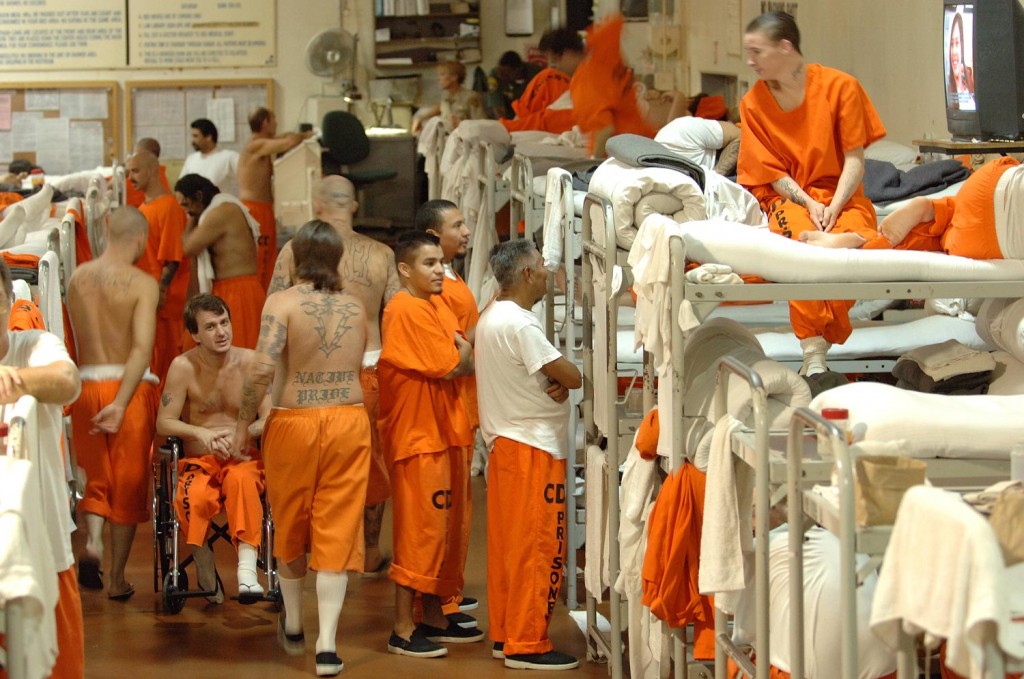
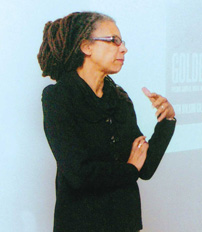
California Inmate Reductions
Last month, the U.S. Supreme Court ruling had ordered California to release 46,000 of its 143,435 inmates which has the state trying to figure out what happens next. The SCOTUS ruling affirmed a lower court order that required California to reduce its inmate population to 137% capacity. The state’s prisons are now at about 180% capacity and one cause of overcrowding problems is the state’s “three strikes law” which puts third time offenders in jail for life. Meanwhile, under Governor Brown’s current “re-alignment” program, the tens of thousands convicted of non violent, non-serious, non-sex crimes will serve sentences under county instead of state supervision. Our guest Professor Ruth Gilmore said to one media source, quote – “County jail expansion does not solve the underlying problems,” – -These are goals we can achieve now if we take this opportunity to shrink prisons and jails. Building bigger jails to ease prison numbers is the same as rearranging the deck-chairs on the Titanic: wasting the same dollars in different jurisdictions.
Professor Ruth Wilson Gilmore:
- California is out of line with the rest of country when it comes to parole policy. California sends twice the number of people back to prisons than other jurisdictions, when the person has committed a technical violation, late for a meeting, that kind of thing.
- For that reason, California prisons have been bulging.
- We see that numbers are kept up by this one category, parole violation return to custody. They have to start over and over and over again.
- The Supreme Court ordered the Department of Corrections to reduce the number of people in its custody in its current physical plant. In the 33 prisons, prison camps and dozens of facilities.
- One method to thin the prison population is shipping about 10 thousand prisoners out of the state of California, renting space in other jurisdictions. They’ve been shipping prisoners out of California for 2 and a half years.
- Cost does not seem to have an important effect on the kinds of political decisions, that have been made about prison expansion throughout the United States for the last 30 years.
- A year and a half ago the state presented a plan to the Ninth District court saying here are the changes that we will make to meet the 3 judges’ order that we reduce the number of people in the California State Authority Physical Plant.
- Then, the 3 judges agreed to let California delay in implementing the plan, while they appealed to the Supreme Court.
- California is the proving ground for a new relationship between the state and society. California is a place that started turning its back on public education.
- For some time, the union of California prison guards were a political force and continue to be quite powerful.
- There are many alternatives to locking somebody in a cage for part or all of their life. We should be cautious in thinking GPS tracking is the answer, because one of the huge barriers, that people convicted of a felony face in their lives, is the impossibility of them reintegrating into society.
- My colleague Michelle Alexander has put out a call in a campaign to end The New Jim Crow.
- Criticalresistance.org / Curbprisonspending.org
Guest – Professor Ruth Wilson Gilmore, author of Golden Gulag: Prisons, Surplus, Crisis, and Opposition in Globalizing California. Professor Gilmore has examined how political and economic forces produced California’s prison boom in Golden Gulag: Prisons, Surplus, Crisis, and Opposition in Globalizing California (University of California Press, 2007), which was recognized by ASA with its Lora Romero First Book Award. Gilmore’s wide-ranging research interests also include race and gender, labor and social movements, uneven development, and the African diaspora. She comes to the Graduate Center from the University of Southern California, where she taught courses in race and ethnicity, economic geography, and political geography, was the founding chair of the department of American studies and ethnicity, and won the USC-Mellon Award for Excellence in Graduate Student Mentoring. She also works regularly with community groups and grassroots organizations and is known for the broad accessibility of her research. She holds a Ph.D. in economic geography and social theory from Rutgers University.
————————————————
Civil Liberties, Criminalizing Dissent, FBI Intrusion, Green Scare, Guantanamo, Habeas Corpus, Human Rights, Iraq War, Military Tribunal, Political Prisoner, Prison Industry, Targeting Muslims, Torture, Truth to Power
Podcast: Play in new window | Download
Updates:
—-

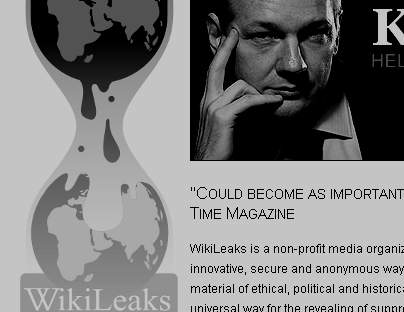
Guantánamo Leaks Must Be Met By Release of Obama Task Force Assessments
The 759 Guantanamo files that were classified “secret” cover nearly every inmate since the camp opened in 2002. The documents obtained by the New York Times and the Guardian last month, reveal how children, the elderly and mentally ill were wrongfully held. The documents also reveal that many prisoners were sent to Guantanamo for nearly nothing or to be interrogated. What did these documents reveal?
Attorney Shane Kadidal:
- These stories started on Monday morning, because administration officials gave out a briefing saying that the nickname of Osama’s couriers was given out by one of the detainees.
- Assuming information taken from Khalid Sheikh Mohammed
- We do know it took eight months from the time they identified this compound to the point they decided to strike at it. I think its clear, they relied on a whole slew of information from a variety of sources.
- We already know the true name of the courier, which is more important than a nickname came from agents on the ground and electronic surveillance.
- 172 detainees, 90 cleared from release, 2/3 of those from Yemen have been indefinitely suspended for repatriation because of the “underwear bomber.”
- The problem is so much of (media) attention is focused on the ones that will never be released.
- WikiLeaks – 2400 pages of documents almost all risk assessments of about 740 detainees who’ve been to Guantanamo
- They represent the Defense Departments best case for detaining someone.
- You have these long analysis of very shady facts, not detailing where allegations are coming from.
- If you look at the documents as a whole, it shows that most of the detainees were held on flimsy, unreliable information.
- The documents show that people were interrogated in GTMO about nothing to do with terrorist attacks in the United States. You had Samuel Hodge interrogated about the inner workings of Al-Jazzera
- Everyone ended up with the categorization of high or medium risk
- When you see a leak of this magnitude, the only corrective is to release more information and that’s what we’ve called for at CCR.
- The government quickly emailed us – They said consistent with the security clearances you signed on for, you have to treat this information as classified (leaked documents) even though its been scattered to the winds on every newspaper on Earth.
Guest – Attorney Shane Kadidal, senior managing attorney of the Guantánamo Global Justice Initiative at the Center for Constitutional Rights in New York City. He is a graduate of the Yale Law School and a former law clerk to Judge Kermit Lipez of the United States Court of Appeals for the First Circuit. In his eight years at the Center, he has worked on a number of significant cases in the wake of 9/11, including the Center’s challenges to the detention of prisoners at Guantánamo Bay (among them torture victim Mohammed al Qahtani and former CIA ghost detainee Majid Khan), which have twice reached the Supreme Court, and several cases arising out of the post-9/11 domestic immigration sweeps.
——-

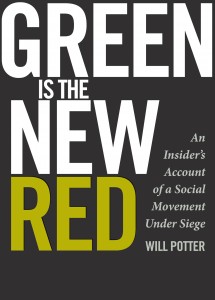

Green Is The New Red: An Insiders Account of A Social Movement Under Siege
We welcome Will Potter award-winning independent journalist and now the leading authority on “eco-terrorism.” He’s the author of the new book ,Green Is the New Red: An Insider’s Account of a Social Movement Under Siege, and it reveals a complex environmental movement emerging amid police state pressure. As we’ve reported here on Law and Disorder, environmental activism have been labeled terrorism under certain interpretation of the Patriot Act, essentially criminalizing dissent and chilling free speech in this country at a critical time. Our guest was an FBI target for merely leafleting against animal testing, and he was threatened to be put on the domestic terrorist watch list if didn’t comply with FBI demands. We talk more about that, the environmentalist movements and his new book.
Will Potter:
- My background is in mainstream newspapers. As I was working as a reporter at the Chicago Tribune, about 9 months after 9/11. I was covering breaking news, blood and guts.
- I decided to go out leafleting on a campaign I became aware of against a controversial animal testing company.
- Couple weeks later the FBI knocks on my door telling me I need to become a government informant and help infiltrate animal rights and environmental groups and if I didn’t they’d put me on the domestic terrorist list.
- It scared the tar out of me. I wish I could say it didn’t.
- Afterward it really lit a fire under me to figure out what was going on.
- One of the reasons I started the website was because of this new law being considered called the Animal Enterprise Terrorism Act.
- What I decided to do with the book is tell the personal stories of the people involved.
- I followed Daniel McGowan a few days before his sentence to how he ended up in this facility, his own journey as an activist. Daniel was convicted of serious crimes, two arsonists that didn’t harm anyone and he was labeled a terrorist.
- The book looks at the wide range of activity being labeled “eco-terrorism”
- The FBI has labeled the environmental and animal rights movement the number one domestic terrorism threat.
- These corporate campaigns were pushed for so long through the courts, politicians, and the press that over time they began to dovetail with government policy.
- The Animal Enterprise Terrorism Act is so broad it can even wrap up non-violent civil disobedience as terrorism, only if its directed at what is called animal enterprises.
- The real power of this is fear.
- The activists who are really effective and pushing the boundary are the ones being labeled eco-terrorists.
- I recently wrote about 3 bills that are under consideration for the Huffington Post. What Is Big Ag Trying To Hide.
Guest – Will Potter, award-winning independent journalist based in Washington, D.C., who focuses on “eco-terrorism,” the animal rights and environmental movements, and civil liberties post-9/11. Will’s work has appeared in publications including the Chicago Tribune, the Huffington Post, and the Vermont Law Review, and he has testified before the U.S. Congress about his reporting. He is the author of Green Is The New Red: An insider’s account of a social movement under siege forthcoming from City Lights Books.
Civil Liberties, Criminalizing Dissent, Crony Capitalism, Green Scare, Habeas Corpus, Human Rights, Political Prisoner, Prison Industry, Targeting Muslims, Torture, Truth to Power
Podcast: Play in new window | Download
Updates:
—–


Court Vindicates Prisoners in Right to Challenge Federal Experimental Isolation Units Restricting Communication
Last month, the Center for Constitutional Rights won the right for prisoners to challenge a violation of their constitutional rights. Prisoners in 2 experimental federal prison units called “Communications Management Units” or CMUs, will have their claims heard in court. About 70 percent of CMU prisoners are Muslim men. Judge Urbina agreed that the prisoners raised serious constitutional questions about CMUs. The Center for Constitutional Rights filed Aref v. Holder in the D.C. District Court on behalf of current and former prisoners of the units in Terre Haute, IN and Marion, IL; two other plaintiffs are the spouses of those prisoners.
As many listeners may know, these CMUs were secretly opened under the Bush administration in 2006 and 2007. They were designed to monitor and control the communications of certain prisoners and to isolate them from other prisoners and the outside world. The five plaintiffs in Aref were designated to the two CMUs despite having relatively or totally clean disciplinary histories, and none of the plaintiffs have received any communications-related disciplinary infractions in the last decade.
In addition to heavily restricted telephone and visitation access, CMU prisoners are categorically denied any physical contact with family members and are forbidden from hugging, touching or embracing their children or spouses during visits.
Attorney Alexis Agathocleous:
- We’re very troubled about policies and conditions at these units. A number of the restrictions imposed at the CMUs are severe. They are truly cutting people off from their loved ones, they’re community and the outside world
- Blanket ban on physical contact, unparalleled to any other single unit anywhere, including Supermax.
- We feel this needlessly impinges on their right to family integrity and their need to maintain these ties to the outside world.
- What we’re challenging is that there is no due process attached to designation to these (CMU) units.
- Without a disclosure of factual allegations that were used to designate them, without a demonstration of past abuse of communication devices, without a hearing, without an appeal. Once you’re there, no one is told how to earn their transfer to get out. Our clients have benign or in some cases perfectly clean histories.
- What is happening is that Muslim prisoners are being designated there, based on the discriminatory belief that as Muslims they inherently pose a great danger to institutional security, than do other prisoners.
- We’re very concerned also about a pattern of designation of political prisoners and specifically includes environmental and animal rights activists.
- We do believe these are acts of retaliation for protected First Amendment activity, such as speaking out on social justice issues.
- What we’ve asked for in the case is a thorough review of polices and practices in the CMUs.
- What’s next is we’re going into discovery, which is our opportunity to learn a lot more about the CMUs, about their inception, who was involved in designing them and why and about how designations are made.
- CMUs were opened quietly.
Guest – Alexis Agathocleous, staff Attorney at the Center for Constitutional Rights and works on CCR’s Government Misconduct and Racial Justice docket. He is lead counsel in Aref v. Holder, challenging policies and conditions at the federal Bureau of Prisons’ Communications Management Units, and Doe v. Jindal, challenging a Louisiana law that requires individuals convicted of Crime Against Nature to register as sex offenders.
—–


Financial Regulators Failed: Crooks Go Unpunished
Last week, the Securities and Exchange Commission Friday charged Goldman Sachs & Co. and one of its executives with fraud in a risky offshore deal backed by subprime mortgages that cost investors more than $1 billion. The SEC also contends that Goldman allowed a client, Wall Street hedge fund Paulson & Co., to help select the securities to be sold. Paulson in turn bought insurance against the deal and when the securities sank, losing nearly all value, Paulson then made a $1 billion profit.
While these are not criminal charges, the recently released 650-page report of the Senate Permanent Subcommittee on Investigations, Wall Street and the Financial Crisis (PDF) had exposed the deceptive and risky practices within major financial institutions, that deceived clients and the public. New Economics Perspective Blog
Professor William K. Black:
- Many people still call it the subprime crisis, it would be far better to call it, the liar’s loan crisis.
- Roughly half of all subprime loans by 2006.
- Somewhere between a quarter and 49 percent of new home loans, were in the form of liar’s loans.
- The incidence of fraud when there have been independent studies has ranged from 90 to 100 percent.
- A liar’s loan is when there is no underwriting, no verification of what’s put into the loan application.
- Overwhelmingly, it was the lenders who put the lie is liar’s loans.
- You can sell these loans in the secondary market if they appeared to have 2 characteristics that finance has told us you can’t have simultaneously.
- A premium interest rate and low risk. You could have the best of both worlds. The way to do that was to gimmick two ratios. Debt to income ratio and loan to value ratio.
- Inflating the value of homes, covered up by industry. An honest secure lender would never inflate value.
- It makes perfect sense for a fraudulent company to inflate the value of the house so they can sell the loan on the secondary market for a higher profit.
- Then Attorney General Cuomo, now governor found this as a common practice at Washington Mutual, the biggest bank failure. WAMU had a blacklist of appraisers, you were blacklisted if you refused to inflate value of property. None of these people are being prosecuted.
- In 2004, the FBI testified there was an epidemic of mortgage fraud and predicted that it would cause a financial crisis.
- The Savings and Loans debacle cost 150 billion, the current crisis is costing over 10 trillion.
- The Office of Thrift Supervision, Chainsaw James Gilleran
- Instead of being embarrassed that they were working hand in glove with the lobbyists, they were proud of this and put this in their annual report.
- Geithner and Cuomo urged there not be investigations much less prosecutions of the elite financial frauds because he thought the financial system was too fragile.
- The Justice Department ruined an FBI initiative to try and investigate the elite frauds.
- If you are powerful enough, if you have enough ties, after citizens united, and make enough political contributions, you will not be prosecuted.
- You can’t have crony-capitalism and democracy either.
- Big finance is only supposed to be a middle man, it’s supposed to help the real economy, by simply allocating most efficiently capital to the most productive uses.
- Like any middle man you want absolutely minimal profits going to the middle man.
- Under some measures, finance has 40 percent of the total profits of all American businesses.
- This is the worst group of people you can possibly imagine having power.
- We’ve turned too many of our schools into fraud factories, where we train people how to gimmick accounting.
- Citizen’s United is a fragile case, it doesn’t make much sense in terms of the law.
- What these people are, engines for destroying wealth
- They only get 10 billion, they destroy 10 trillion dollars in wealth. They cost 10 million Americans their jobs.
Guest – William K. Black, a professor of law at University of Missouri, Kansas City who has criticized the absence of any criminal referrals or national task force to effectively punish the elite fraudsters. Professor Black teaches White-Collar Crime, Public Finance, Antitrust, Law & Economics.
——————————————————-
Civil Liberties, Criminalizing Dissent, Habeas Corpus, Human Rights, Targeting Muslims, Truth to Power, War Resister
Podcast: Play in new window | Download
Updates:
—
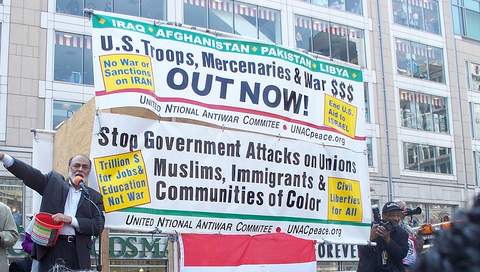
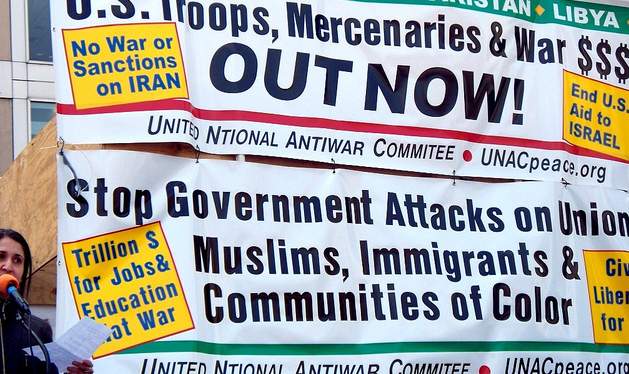
The Muslim Peace Coalition and the United National Antiwar Coalition
Last week, activists took to the streets in a mass anti-war demonstration in the streets of New York and around the country. We talk with one of the organizers. Imam Abdul Malik Mujahid, founder of the Muslim Peace Coalition who joins us to discuss his work as executive producer of Chicago’s Radio Islam. He’s among the most well-known Muslim activists in the country and has recently completed a 3 state tour having addressed dozens of mosques demanding an end to the ongoing attacks and spying on Muslim communities.
Malik Mujahid:
- 700 thousand Muslims have been interviewed by the FBI. Most of the mosques have been checked out for atomic bombs. What they think is a Muslim could be a brown skinned guy, who is Hindu, or could be Latino.
- Once you start doing injustice in one group, it doesn’t stay in one group. At this moment there’s quite a bit of inhumanity toward undocumented workers which are in larger numbers.
- The personal cost is very high. A Yale University research, says that 50 percent of Arab Americans have clinical signs of depression. Muslims are last to hired and first to be fired.
- People can get out of this when they realize there’s a criminalization in the inner city.
- Latinos the largest minority in this country lives in a state of fear, becaust they may be mistaken for undocumented and green card holder.
- 75 Pecent of Latinos stopped or arrested for suspect of documentation actually are quite legal citizens from several generations.
- The whole thing is based on a myth that Muslims were responsible for 911 and the continued terrorist attacks.
- War and terrorism are connected through occupation. We say that the hate in the country is rising, we’re becoming an unwelcoming nation. I visited the 1199 in New York and I was surprised how welcoming they were.
- 2.5 million Americans became new gun owners last year.
Guest – Imam Abdul Malik Mujahid is founding Chairman of Sound Vision Foundation, the leading producer of educational content on Islam and Muslims. He is also executive producer of the daily Radio Islam talk show on WCEV 1450 AM in Chicago. Imam Mujahid serves as Chair of the Council for a Parliament of the World’s Religions, the premiere interfaith organization in the world. He is former Chairperson of the Council of Islamic Organizations of Greater Chicago.
—–

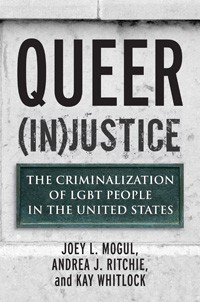
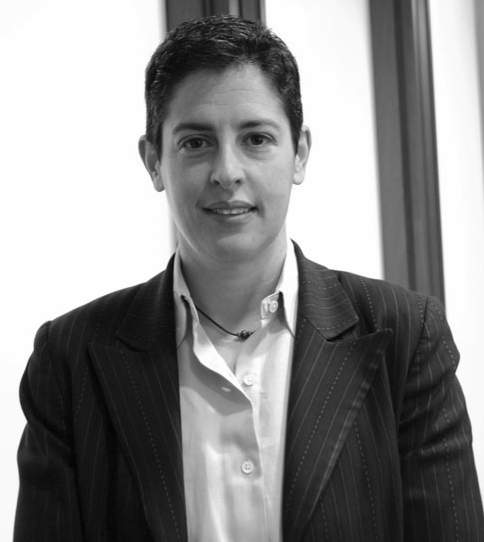
Queer (In)Justice: The Criminalization of LGBT People in the United States
We’re joined today by two of the three authors of book titled Queer (In)Justice: The Criminalization of LGBT People in the United States. Joey Mogul, director of the DePaul Civil Rights Clinic and partner with the People’s Law Office, and Andrea Ritchie, a Police Misconduct Attorney. The criminalization of LGBT people is explained in the book with acute detail and historical research. The book reveals that continual targeting of queers by law enforcement is not an accident but part of a larger systemic issue. The cases covered in this searing book show how the legal system routinely discriminates against those identified as queers. But there’s more to it than that, other factors such as poverty, race and class also make them a target. We learn more about the book and how this discrimination is viewed within the mainstream gay community.
Attorneys Joey Mogul / Andrea Ritchie:
- The term trans-gender is an umbrella term, that is inclusive of gender identities. It encompasses people who are born with a particular genitalia, but whose gender expression or identity is different from their anatomy.
- We use the term criminal legal system because the system has produced anything but justice for people who fall under the umbrella of LGB or T.
- Sometimes its a cop writing you a ticket for disorderly conduct, because they perceive your expression in a public space to be disorderly.
- Once they get to the police precinct and they don’t know which box to check, that can result in being searched. Not for any lawful purpose as contraband, weapons but to determine what your anatomy is because they feel like that’s relevant in which box to check for you.
- What we’re seeing nationwide is police officers unsure of someone’s identity, police stations nationwide have no guidelines in determining someones gender. What we’re seeing is these genital checks.
- There have been transgender women who’ve been searched in San Francisco, who’ve not only experienced these humiliating strip searches but then have been forced to dance or masterbate, in front of these officers.
- They want to humiliate and punish based on their gender identity.
- Really things are getting better for a small minority of LGTB and the vast majority end up facing these patterns of criminalization. In the court systems, we’re seeing individuals whose sexual orientations or gender identity is being used against them.
- Archetype of queers as a security threat. We talk about prisons as queer spaces in that, we see prisons being used as a tool to say that gay people are the predators.
- My home is the People’s Law Office. The work I do is police and government misconduct cases and I do death penalty cases. But I’m queer. I do hold myself out to the queer community and I do get these cases.
- Walking While Trans. One encounter with a cop can change your whole life.
- It’s really important for us to reach out to Guild Members, this is state sponsored homophobia and trans-phobia.
Guest – Attorney Andrea Ritchie, is a police misconduct attorney and organizer in New York City.
Guest – Attorney Joey Mogul, a partner at the People’s Law Office in Chicago and director of the Civil Rights Clinic at DePaul University’s College of Law. She focuses on civil rights cases involving police misconduct, criminal cases brought against individuals engaged in street demonstrations and other forms of First Amendment expression, and capital defense cases.
—————————————————-
CIA Sponsored Terror, Civil Liberties, Criminalizing Dissent, Habeas Corpus, Human Rights, Prosecution of the Bush Administration, Surveillance, Targeting Muslims, Torture, Truth to Power
Podcast: Play in new window | Download
Updates:
——
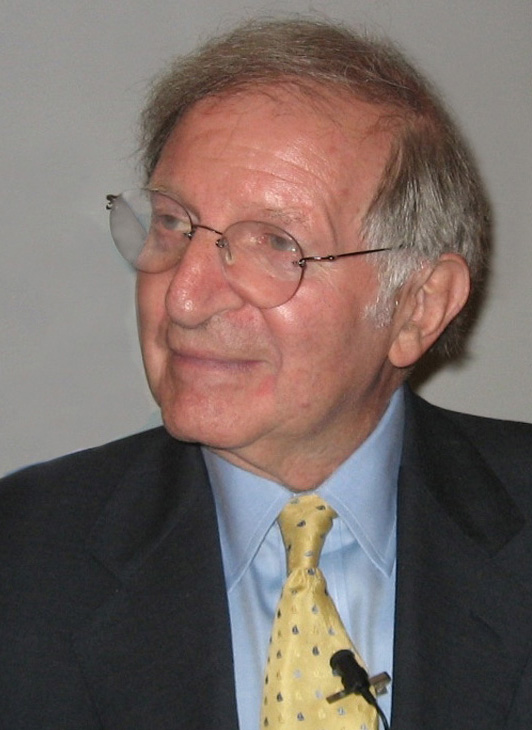

In Memory of Attorney Leonard Weinglass
Hosts remember one of the great civil rights attorneys, Leonard Weinglass from his early years as a lawyer in the Air Force to his big cases. Michael Smith shares a great anecdote. Len vigorously defended a black soldier and upset the Air Force brass. They sent him to Iceland for 2 years. Much later in the late fifties, he moved to Newark, NJ, set up a one man office and represented black people in police abuse cases.
The remarkable and heroic progressive lawyer Len Weinglass died on March 23. Among his cases were the Chicago 8, the Ellsberg case and the Cuban 5. He was our close comrade and will be missed by his friends and all those seeking a better world. – Michael Ratner.
——–
A Poem for Len Weinglass by Linda Backiel
Almost Ready
“I have everything almost ready for the spring,”
you said. Brush cut, brambles cleared, new trees
planted. A lop-sided smile flit across your silver
stubble beard, a late winter field momentarily lit
by a break in a fleet of migrating clouds.
click for more
——–
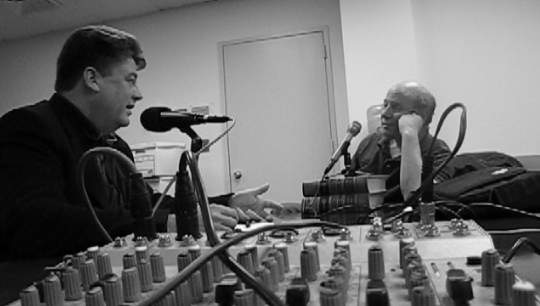
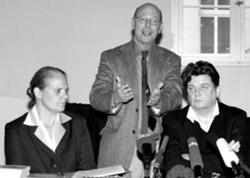
Universal Jurisdiction: Attorney Wolfgang Kaleck
Co-host Michael Ratner interviews attorney Wolfgang Kaleck, German civil rights attorney and General Secretary for the European Center for Constitutional and Human Rights. They discuss the effectiveness of Universal Jurisdiction cases. The cases that helped international human rights prosecutions. Specifically the cases in Argentina against corporations that profited from dictatorships and human rights abuses and how Argentina can be used as a model to bring cases against other powerful leaders or corporations. Optimism overcomes cynicism, Wolfgang says its not easy, it’s work bringing cases against the powerful of the world.
Attorney Wolfgang Kaleck:
- I have the privilege to work on behalf of Germans and Argentinian victims of the Dirty War between 1976 and 1983 in Argentina.
- The Argentinian cases and the Chilean cases were the most important phase in universal jurisdiction.
- We filed cases in Germany, Italy and France.
- The idea to file Argentinian and Chilean cases in European courts was not to try Argentinians and Chileans in Europe but to impose accountability in Chile and Argentina.
- That’s what people call the Pinochet Effect.
- In 2005 and 2006 when the amnesty laws were abolished. If you go to Buenos Aries now you will observe military junta tribes from Monday to Friday and you will police officers, military leaders, torturers, guards.
- At this point, special prosecutors and parts of the civil society are demanding an investigation and prosecution into crimes committed by corporations who aided and abetted the dictatorship, or who profited from the dictatorship.
- The history in Argentina, 30 thousand people disappeared, 100 thousand were tortured.
- The human rights movement in Argentina was so strong, that they maintained a certain presence, a certain public attention.
- For us, Argentina is like the blue print. They inspired the human rights movement not only in Europe
- I filed a case at Mercy Dispense because in Buenos Aires, 15 trade unionists were disappeared. We filed the criminal case in Germany against a German-Argentinian manager who had duel citizenship which allowed us to bring the case in Germany. Then we filed a case in the US, an alien tort claims which is still pending. We filed a case in Argentina which is still pending.
- One line is to blame the torturers and the torturer leaders, we want to talk about why these human rights violations have been committed. Why the Argentinian military took the decision to oppress their populations and our explanation is that they wanted to install a political and economic system which needed the extermination of the trade unionists.
- Actually to demand accountability and do these investigations is trauma work. Society that hasn’t dealt with its past has some problems in the present. Argentina is worth studying as an example.
- Universal Jurisdiction is showing its limits. So far it was very difficult to bring cases against the powerful of the world.
- The suspicion that the criminal justice system is just another tool of the powerful against the powerless,
- We have to try to bring cases against the powerful, Russian, China, the US, or Sri Lanka or Israel, who all undertake actions to avoid prosecution.
- We are very optimistic that some investigation will be carried out in Spain but some people are over-pessimistic, because even now, we achieved that several former US officials, or from the CIA or from the Army, or politicians can’t travel anymore, without running the risk to be arrested.
- We achieved something, I’m also not satisfied from it but still its more than we thought possible.
- President Bush wanted to go to Switzerland.
- It’s always an argument against those cynical people who say nothing is possible. Yes there is, something is possible. We do have to struggle to maintain this, the whole international criminal justice system is at stake.
Guest – Attorney Wolfgang Kaleck, a German civil rights attorney. He is also the General Secretary for the European Center for Constitutional and Human Rights. On November 14, 2006, Kaleck sought criminal prosecution charges in German court against a number of US officials and military personnel in connection with alleged human rights abuses at the prison facilities at Abu Gharib and Guantanamo Bay on behalf of eleven plaintiffs. Approximately 30 human rights activists and organizations participated as co-plaintiffs























